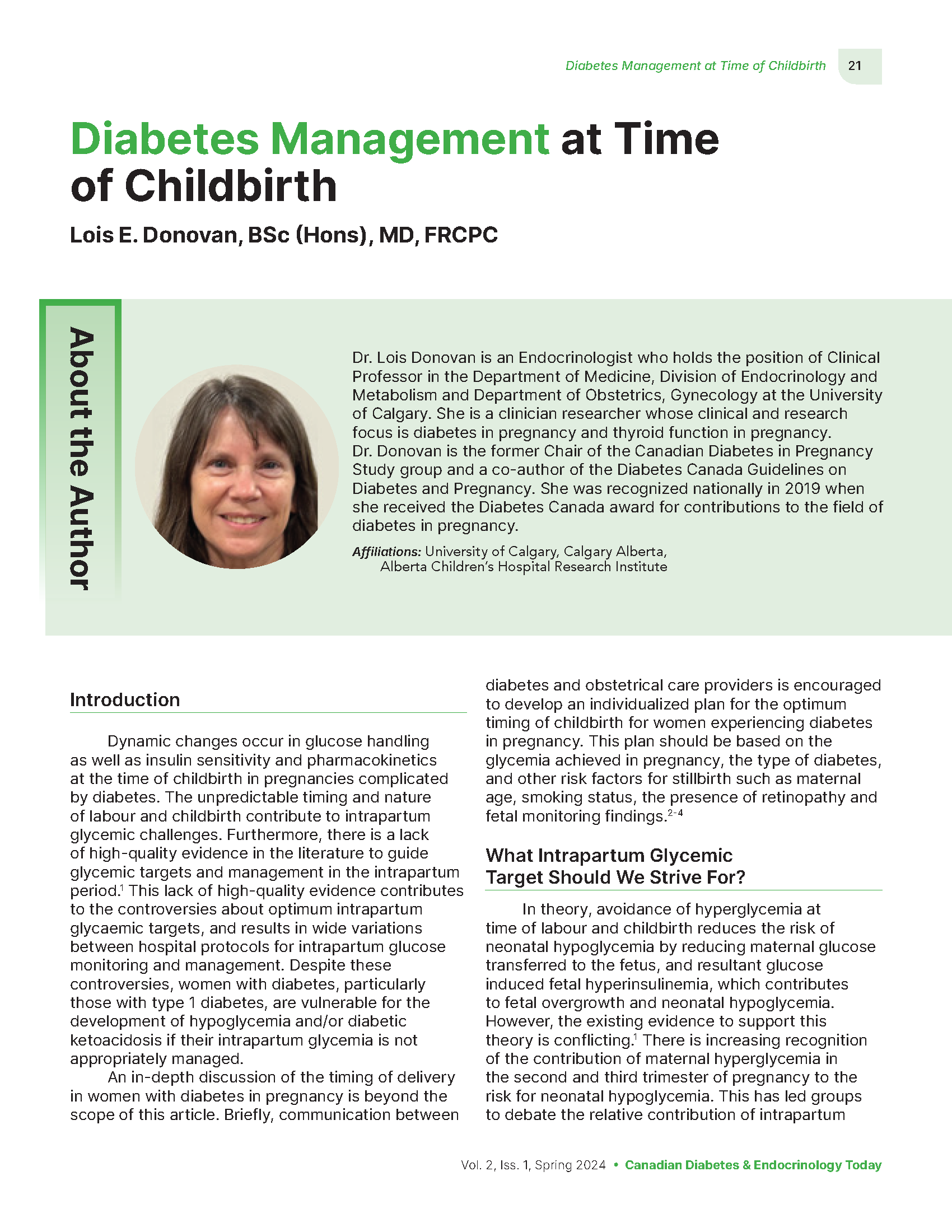Diabetes Management at Time of Childbirth
Abstract
Dynamic changes occur in glucose handling as well as insulin sensitivity and pharmacokinetics at the time of childbirth in pregnancies complicated by diabetes. The unpredictable timing and nature of labour and childbirth contribute to intrapartum glycemic challenges. Furthermore, there is a lack of high-quality evidence in the literature to guide glycemic targets and management in the intrapartum period. This lack of high-quality evidence contributes to the controversies about optimum intrapartum glycaemic targets, and results in wide variations between hospital protocols for intrapartum glucose monitoring and management. Despite these controversies, women with diabetes, particularly those with type 1 diabetes, are vulnerable for the development of hypoglycemia and/or diabetic ketoacidosis if their intrapartum glycemia is not appropriately managed.
An in-depth discussion of the timing of delivery in women with diabetes in pregnancy is beyond the scope of this article. Briefly, communication between diabetes and obstetrical care providers is encouraged to develop an individualized plan for the optimum timing of childbirth for women experiencing diabetes in pregnancy. This plan should be based on the glycemia achieved in pregnancy, the type of diabetes, and other risk factors for stillbirth such as maternal age, smoking status, the presence of retinopathy and fetal monitoring findings.
References
Yamamoto JM, Benham J, Mohammad K, Donovan LE, Wood S. Intrapartum glycaemic control and neonatal hypoglycaemia in pregnancies complicated by diabetes: a systematic review. Diabet Med. 2018;35(2):173-183. doi: 10.1111/dme.13546
Murphy HR, Howgate C, O’Keefe J, Myers J, Morgan M, Coleman MA, et al. Characteristics and outcomes of pregnant women with type 1 or type 2 diabetes: a 5-year national population-based cohort study. Lancet Diabetes Endocrinol. 2021;9(3):153-164. doi: 10.1016/S2213-8587(20)30406-X
Lemieux P, Benham JL, Donovan LE, Moledina N, Pylypjuk C, Yamamoto JM. The association between gestational diabetes and stillbirth: a systematic review and metaanalysis. Diabetologia. 2022;65(1):37-54. doi: 10.1007/s00125-021-05579-0
Tennant PW, Glinianaia SV, Bilous RW, Rankin J, Bell R. Preexisting diabetes, maternal glycated haemoglobin, and the risks of fetal and infant death: a population-based study. Diabetologia. 2014;57(2):285-294. doi: 10.1007/s00125-013-3108-5
Yamamoto JM, Donovan LE, Mohammad K, Wood SL. Severe neonatal hypoglycaemia and intrapartum glycaemic control in pregnancies complicated by type 1, type 2 and gestational diabetes. Diabet Med. 2020;37(1):138-146. doi: 10.1111/dme.14137
Dashora U, Levy N, Dhatariya K, Willer N, Castro E, Murphy HR, & Joint British Diabetes Societies In Patient group. Managing hyperglycaemia during antenatal steroid administration, labour and birth in pregnant women with diabetes –an updated guideline from the Joint British Diabetes Society for Inpatient Care. Diabet Med. 2022;39(2):e14744. doi:10.1111/dme.14744
Diguisto C, Strachan MWJ, Churchill D, Ayman G, Knight M. A study of diabetic ketoacidosis in the pregnant population in the United Kingdom: investigating the incidence, aetiology, management and outcomes. Diabet Med. 2022;39(4):e14743. doi: 10.1111/dme.14743
Drever E, Tomlinson G, Bai AD, Feig DS. Insulin pump use compared with intravenous insulin during labour and delivery: the INSPIRED observational cohort study. Diabet Med. 2016;33(9):1253-1259. doi: 10.1111/dme.13106
Stewart ZA, Yamamoto JM, Wilinska ME, Hartnell S, Farrington C, Hovorka R, et al. Adaptability of closed loop during labor, delivery, and postpartum: a secondary analysis of data from two randomized crossover trials in type 1 diabetes pregnancy. Diabetes Technol Ther. 2018;20(7):501-505. doi: 10.1089/dia.2018.0060
Wang XS, Dunlop AD, McKeen JA, Feig DS and Donovan LE. Real-world use of Control-IQ ™ technology automated insulin delivery in pregnancy: a case series with qualitative interviews. Diabet Med. 2023;40(6):e15086. doi: 10.1111/dme.15086
Lemieux P; Yamamoto JM, Donovan LE. Do-it-yourself artificial pancreas system use in pregnant women with type 1 diabetes in a real-world setting: 2 case reports Can J Diabetes. 2021;45(8):804-808.e2. doi: 10.1016/j.jcjd.2021.01.006
Donovan LE, Feig DS, Lemieux P, Murphy HR, Bell RC, Sigal RJ, et al. A randomized trial of closed-loop insulin delivery postpartum in type 1 diabetes. Diabetes Care. 2023;46(12):2258-2266. doi: 10.2337/dc23-0882
Gu J, Chaput KH, Dunlop A, Booth J, Feig DS, Donovan LE. Existing standardised questionnaires do not adequately capture quality-of-life outcomes of greatest importance for those living with type 1 diabetes in pregnancy. Diabet Med. 2023;40(4):e15044. doi: 10.1111/dme.15044
Diabetes Canada Clinical Practice Guidelines Expert Committee, Feig DS, Berger H, Donovan LE, Godbout A, Kader T, et al. Diabetes and Pregnancy. [published correction appears in Can J Diabetes. 2018 Jun;42(3):337]. Canadian J Diabetes. 2018;42 Suppl_1:S255-S282. doi: 10.1016/j.jcjd.2017.10.038
Ringholm L, Roskjaer AB, Engberg S, et al. Breastfeeding at night is rarely followed by hypoglycaemia in women with type 1 diabetes using carbohydrate counting and flexible insulin. Diabetologia. 2019;62(3):387-398. doi: 10.1007/s00125-018-4794-9

Downloads
Published
How to Cite
Issue
Section
License
Copyright (c) 2024 Canadian Diabetes & Endocrinology Today

This work is licensed under a Creative Commons Attribution-NonCommercial-NoDerivatives 4.0 International License.
